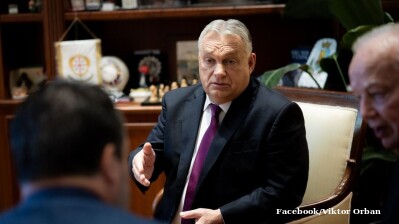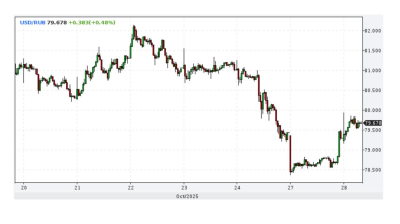President Zelenskiy's Servant of the People party wins a landslide victory in Ukraine’s snap general election

The Servant of the People (SOTP) party of Ukraine’s President Volodymyr Zelenskiy won a landslide victory in Ukraine’s snap general election on July 21, taking 44.2% of the vote, according to the National Exit poll results released at 6pm local time.
That means SOTP will have to form a coalition with one of the other four parties that cleared the 5% threshold to enter the Verkhovna Rada in order to control parliament.
The runner up with 11.4% was the pro-Russia Opposition Platform led by Yuriy Boyko, but all the other parties have ruled out forming a coalition with this party.
Former president Petro Poroshenko’s European Solidarity and former prime minister Yulia Tymoshenko’s Batkivshchyna (Fatherland) came in third and fourth with 8.8% and 7.4% respectively.
And political newcomer, Ukrainian rock star Svyatoslav Vakarchuk and his Golos (aka Holos, or Voice) party was in fifth place with 6.5%.
|
Leader |
Party |
Share of the vote |
|
Voldymyr Zelenskiy |
Servant of the People |
44.2% |
|
Yuri Boyko |
Opposition Platform - For Life |
11.4% |
|
Petro Poroshenko |
European Solidarity |
8.8% |
|
Yulia Tymoshenko |
Batkivshchyna |
7.4% |
|
Svyatoslav Vakarchuk |
Golos |
6.5% |
Source: National Exit poll
On the basis of these results SOTP can form a ruling coalition with any of the four other parties. However, as no one intends to tie up with the Opposition Platform and Zelenskiy has said earlier that he will not go into a coalition with rival Poroshenko, the most likely coalition is with either Golos or Batkivshchyna.
Of these two Zelenskiy’s top staff says SOTP will not form a coaltion with any of the existing partlies but only with “new” parties, which leaves Golos as the most likely coalition partner. But now the horsetrading starts and the job of prime minister is the big prize on offer.
Shortly after the exit poll results were announced Yaroslav Yurtchychyn, one of Golos' main figures, said Varkarchuk's party is ready for a coalition with European Solidarity and Fatherland if they support de-oligarchisation of the country. This is almost certainly political posturing as the combined vote tally of the three parties comes to 22.7%, which is not enough to form a government. Even including the pariah Opposition Platform in this coalition still only brings the tally to 34.1% — still not enough to form a government.
But the negotiations for the prime minister post are likely to be hard fought. SOTP won by a factor of three and Zelenskiy is likely to insist on the right to appoint his own choice of prime minister but to concede one of the other top jobs like foreign minister to his coalition partner.
Indeed, Zelenskiy has made it clear that he wants to break with the old political guard and that is a major part of his appeal at the polls. Speaking to journalists in Kyiv after he voted and was asked who may be prime minister he said that he was in negotiations with several candidates but wants a “professional economist without a political past.”
The comment bolsters speculation that Zelenskiy will appoint a technocrat prime minister to oversee the implementation of a radical reform programme. The comment also makes it highly unlikely that he will enter a coalition with Tymoshenko’s Batkivshchyna party as Tymoshenko has already clearly said in public she wants to be prime minister again.
Things to do
The July 21 vote is by far the most democratic in the Former Soviet Union (FSU) and will have far-reaching consequences – and not just for Ukraine. The election of total political outsiders en masse to parliament is unprecedented in Eastern Europe where candidates almost always have to have some sort of institutional background. There has been a swathe of protests across the entire region from Kazakhstan, through Armenia and Southeast Europe as the populations politically mature and have become more demanding of their leaders to deliver on the promise of a better life for everyone, not just their cronies at the top of the pyramid.
“To all post-Soviet countries: look at us. Anything is possible!” outsider Zelenskiy told cheering crowds after he won a crushing victory over incumbent Poroshenko in the April 21 presidential election run off, as bne IntelliNews noted in an op-ed “President Zelenskiy is the wind of change” at the time.
In this regard Zelenskiy’s win in Ukraine is an existential threat to President Vladimir Putin's regime in Russia, as if Zelenskiy can deliver on a better life in Ukraine that would be the most effective way to undermine Putin’s regime in Russia.
For Ukraine the vote in the crucial snap election will set the country’s course for at least the next five years and represents another opportunity to introduce the radical reforms that could cause the economy to boom.
After more than two decades of neglect Ukraine has nearly all of the fast “catch up” growth ahead of it. Successive governments have failed to make any meaningful reform, which has lead to incomes falling to the point where Ukraine is the poorest country in Europe.
Riding on a wave of popular support and disillusionment with the failures of the Poroshenko administration to carry through on the promises inherent in the Euromaidan popular uprising, voters swept Zelenskiy into office in a landslide victory in April.
In the run up to this election Zelenskiy has on several occasions mentioned the need to attract investment to Ukraine, which is badly needed to kickstart the stagnant economy. The president mentioned the need for investment again on election day, calling for change to attract investors.
“I will not use the power [from a victory in the parliamentary elections]. The parliament operates separately from the president. We have to work together to attract investment into the country,” Zelenskiy told journalists as he emerged from the voting station.
The war and political uncertainty have held investment back. The stock of foreign direct investment (FDI) in Ukraine declined by 0.2% quarter-on-quarter in January-March to $41.5bn, the nation's state statistics service Ukrstat reported on May 30. It was weighed down by contracting loans of direct investors, which declined by $131mn. Most of what FDI inflows there are came from Russia ($138mn) and Cyprus ($106mn) in the first quarter.
"We expect political turbulence will ease after the parliamentary elections on July 21 and subsequent government formation. As soon as the situation stabilises, we project a revival of investments to Ukraine. We expect $2.4bn net FDI by the year end," Evgeniya Akhtyrko at Kyiv-based brokerage Concorde Capital wrote in a note on June 4. This would be an increase from the $1.9bn invested in 2017.
Fixed investment in general is largely on hold due the external and internal political instability. Having said that fixed investment in the first quarter of this year of UAH102.6 billion ($45.8bn) was ahead of the UAH81.5bn invested in the same period a year earlier. Two fifths of investment is going into industry and another 10% into agriculture — the two most important sectors in the economy.
Sweeping away the old guard
By taking control of the Verkhovna Rada Zelenskiy’s SOTP will now sweep most of the old guard politicians out of office and bring in a new generation of first-time deputies that are unconnected to either the old political regimes that have run Ukraine into the ground over the last two decades or the business elite that have stacked the Rada with their proxies.
Zelenskiy is also hinting strongly that he will launch an anticorruption drive to clean out the influence of the oligarchs from government and put an end to the scams and extortion schemes that have been used by well connected businessmen to enrich themselves. In further remarks to journalists on voting day he repeated earlier comments that the first job of the new parliament would be to lift the immunity from prospection that deputies enjoy.
Most of the old guard have been associated with one of the several oligarchs that have captured the economy and focused on using their political power to further their business interests. However, simply ejecting their proxies from government will be only the first step in taking back control of the country for elected officials, and the process is likely to be messy.
Certainly the population have high hopes for real change. A recent International Republican Institute (IRI) poll found that those that think Ukraine is going in the “wrong direction” plummeted just ahead of the election. Under former president Viktor Yanukovych around 70% of Ukrainian thought that the country was going in the wrong direction. After a brief period of optimism during the Euromaidan protests in 2014 when this number fell to a low of 48%, the population was quickly disillusioned again and under Poroshenko’s administration some 70% Ukrainians again thought that the country was still going in the wrong direction. Despite the hyped western support of Poroshenko’s administration, Ukrainians themselves thought their new president was as bad as the one they ousted. Only 9% of Ukrainians trusted the government just ahead of the presidential election – an all time low.
The Zelenskiy phenomena has breathed new life into politics in Ukraine and the share of those that though Ukraine was going in the wrong direction ahead of this election suddenly plummeted to 39% ahead of the vote. Ukrainians are yearning for change and happy to trust a political neophyte largely for exactly that reason: Zelenskiy is a break with the failed policies of the established elite and any change is better than the status quo, is what the poll suggests Ukrainians are thinking.
Of course it will be easy to fail to meet such high expectations, but with a clear mandate from the people and an entirely new set of faces in charge Ukraine has yet another opportunity to break with the past and make the deep structural changes it so desperately needs to flourish.

Playing hardball
On the eve of the elections officers from the National Anti-Corruption Bureau of Ukraine (NABU) raided the offices of investment bank ICU in Kyiv and Bogdan Motors, a major engine producer, both with ties to former president Poroshenko. The next day officers from the Security Service of Ukraine (SBU) raided the ArcelorMittal Kryvyi Rih steel mill, the biggest foreign investment in the country.
This coupled with Zelenskiy's demand that the immunity from prosecution be lifted from Rada deputies and his promise to set up the Anti-Corruption Court demanded by Ukraine’s donors by September suggests a major anti-corruption drive is on its way.
One of the targets of this drive could well be Poroshenko, who is an investor in ICU and was an investor in Bogdan Motors. Poroshenko promised to give up his business interests when he took office, but as bne IntelliNews detailed in a feature “Poroshenko’s empire – the business of being Ukraine’s president” in August 2016 he kept control of most of his businesses. Indeed, Poroshenko increased defence spending to 5% of GDP and Bogdan Motors was a major recipient of state contracts.
At the same time Poroshenko protected allies close to him that were accused of corruption. In the highest profile case Roman Nasirov was head of Poroshenko’s financial control office and indicted by NABU for embezzling millions of dollars. Not only was he never put on trial, but a court reinstated him in his old job and he ran as a candidate in the presidential election earlier this year.
An investigation into Poroshenko is warranted but could be dismissed as political sour grapes on Zelenskiy's part, however, the more worrying question is the president’s relation with his backer uber-oligarch Ihor Kolomoisky.
It remains possible that Zelenskiy is no more than a Kolomoisky puppet. Earlier this year several Kyiv courts ruled to undo the nationalisation of Kolomoisky’s Privatbank in what were clearly corrupt decisions, as former National Bank of Ukraine (NBU) governor Valaria Gontareva told bne IntelliNews in a recent interview.
An investigation by bne IntelliNews into the bank’s loan book “Privat Investigations” found the largest part of the bank’s deposits were stolen by Kolomoisky using fake loans to shell companies, a fact that was later confirmed by the NBU and a forensic investigation by Kroll.
Yet Zelenskiy has said little on the topic as he needed Kolomoisky’s continued media support during the Rada election campaign, although he did say explicitly that he would not allow the bank to be denationalised when pushed.
All said and done Zelenskiy has done nothing and said little to date to show his commitment to a radical reform programme. He has said the right things and clearly won the people over, but holding only the president's office until now he has had no real power to make any change. The president has direct control over the foreign ministry and the ministry of the interior, and has the ability to appoint the general prosecutor, but all of the nuts and bolts ministers' jobs like economics, social and health are under the control of the Rada. By taking control of the Rada Zelenskiy now has a full house of cards and is able to make the changes needed.
News
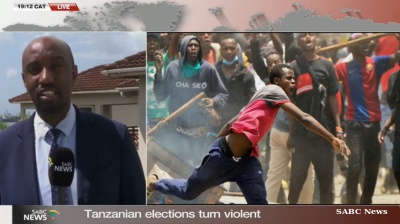
Tanzania election protests trigger curfew; military deployed, internet cut
Demonstrators clashed with security forces in Dar es Salaam, setting a bus and a gas station ablaze, prompting authorities to impose a curfew from 6 p.m. The military was deployed in Dodoma, Zanzibar, and the commercial capital.

US strikes on drug vessels kill 14 in deadliest day of Trump's narcotics campaign
The US military killed 14 people in strikes on four vessels allegedly transporting narcotics in the eastern Pacific Ocean, marking the deadliest single day since President Donald Trump began his controversial campaign against drug trafficking.
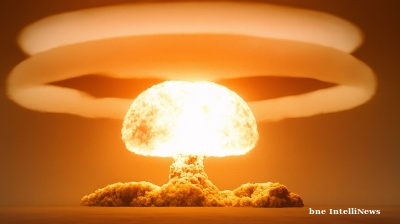
Russia withdraws from Cold War plutonium disposal pact with US
Russian President Vladimir Putin has formally withdrawn from a key arms control agreement with the United States governing the disposal of weapons-grade plutonium, as the few remaining nuclear security accords between the two powers vanish.
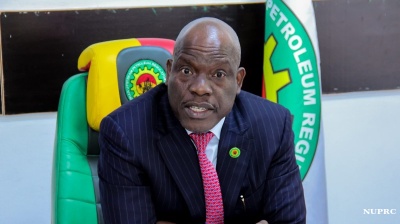
Nigeria’s NUPRC holds exploratory talks with Bank of America on upstream financing
Nigeria's upstream regulator, NUPRC, has held exploratory talks with Bank of America as the country looks to attract new capital and revive crude output, after falling short of its OPEC+ quota.
